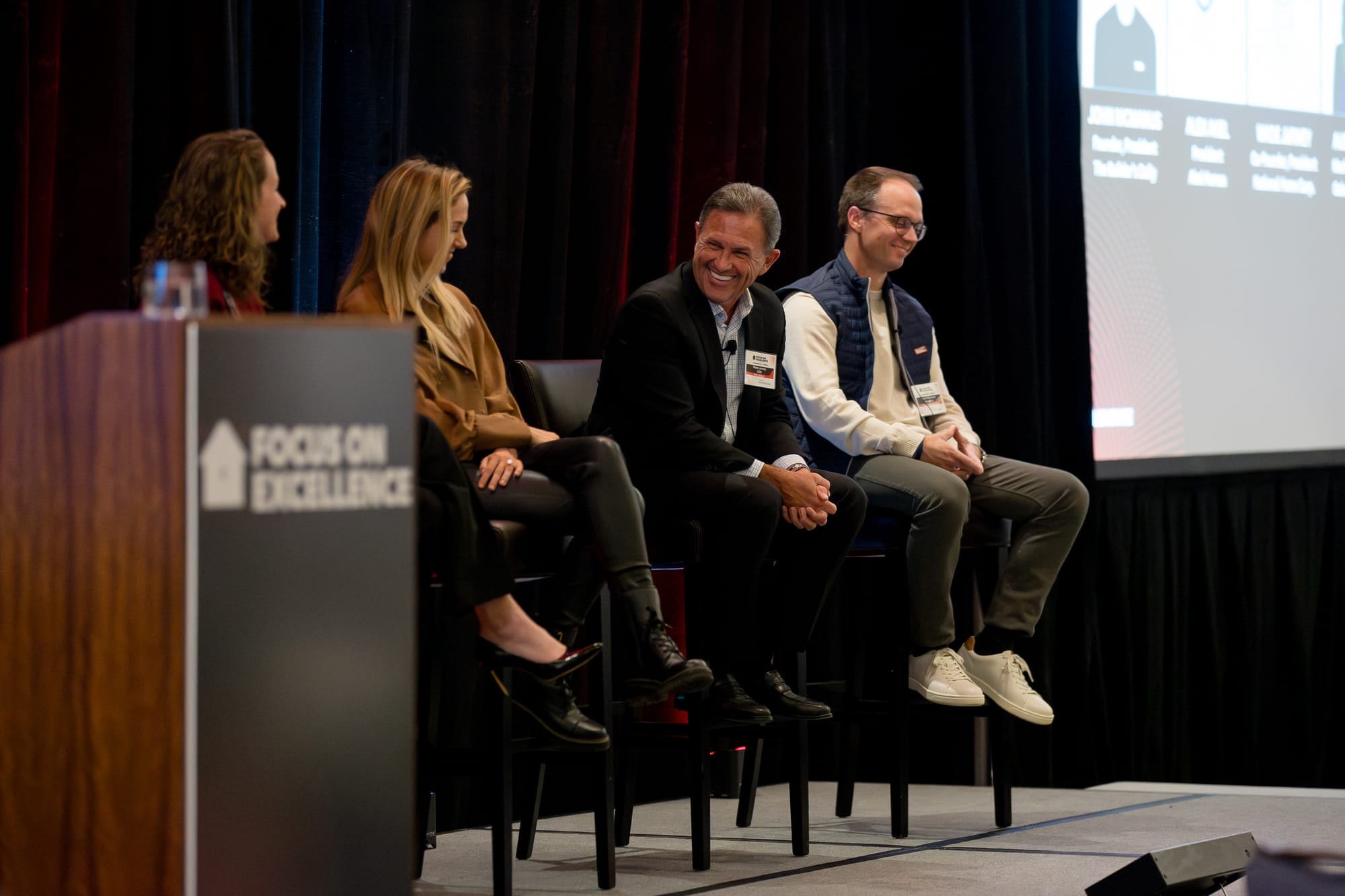Leadership
How High Performing Builders Are Winning The Margin War
Margins are shrinking, and market tailwinds are gone. At Focus on Excellence in Denver, builder presidents shared the hard truths—and proven tactics—behind operational discipline, cycle-time mastery, and the relentless pursuit of efficiency.

Control what's controllable.
It's a timeless mantra among homebuilding strategic and operational leaders, and it was topmost in mind at Focus on Excellence in Denver last week.
Simple idea. Hard to do.
There are many external factors beyond any homebuilding organization’s control — Federal Reserve policy, sluggish homebuyer demand, tariffs, high mortgage rates, and the future impacts of AI on the economy, to name a few. Homebuyers are stretched, and margins are thin.
Builders can’t control these uncontrollables, but they can control how they react to unfavorable market conditions.
The Presidents Panel that opened the Focus on Excellence agenda honed in on one message: homebuilders must meet this moment, adapt, and obsessively focus on operational efficiency. The following analysis uses verbatim quotations from that session.
I don’t think raising house prices is going to be in our vocabulary in the industry for three years,” – Wade Jurney, Co-Founder and President, National Home Corp.
Houston-based National Home Corp. aims to be one of the most affordable builders in the nation. The company’s entry-level buyers are squeezed right now and are struggling to buy homes at current prices.
If National Home Corp.’s prices won’t go up, then costs must go down through a combination of more efficient build cycles, more favorable lot contracts, or lower contractor pricing.
I've heard someone say, 'costs can never go down.' Well, they'd better!” Jurney said.
Those words helped capture the gist of the discussion. How can homebuilders cut costs and protect margins, while also providing a quality product?
We obsess over the 10%. All of us can get the 90% right,” – Alex Akel, President, Akel Homes.
In a market where builders need to differentiate themselves, South Florida-based Akel Homes is laser-focused on creating a resort-style living experience.
We are honing in on what's going to really set us apart and make us different from our competition, and that's from a quality perspective,” Akel explained.
The builder’s upcoming 55+ Catalina Palms at Sundance community in Port St. Lucie will meet that criteria with a massive clubhouse.
We have a very strong, amenity-driven homebuyer in South Florida, especially among the 55-plus. I mean, they don't buy green bananas. They buy the yellow bananas. They don't want to wait for the amenities to be built. They want them the moment that they move in. So we have to get our amenities right. The 56,000-square-foot clubhouse is what we're proposing for the first community,” Akel said.
Akel Homes, unlike National Home Corp., doesn’t go after entry-level buyers. That doesn’t mean that pricing isn’t a concern. Akel recommended forming close relationships with contractors, as business partners that are true friends will be more receptive to negotiating a lower rate.
They become my friends more than business partners, and when you build those relationships, you're able to get firm pricing,” Akel said. “That's the 10% that makes the big difference when you're trying to differentiate from the pack.”
It’s pretty sluggish out there right now,” – David McDonald, President, Defy Investments and Davis Homes
David McDonald is on the capital side of homebuilding. His company, Defy Investments, acquired Indiana-based Davis Homes earlier this year. McDonald, a newcomer to the homebuilding market, is focused on growing Davis Homes with less capital and tight cash flow.
“In the midst of that, we're making all sorts of investments into the company to spur growth,” McDonald said.
Davis Homes, based in Indianapolis, is planning to grow with expansions into markets in northeast and northwest Indiana.
“We just want to do that prudently. We want to do that in a way that's liable for the balance sheet. We want to grow profitably, and we're not beholden to Wall Street. We don't take any external capital. We're all self-funded,” McDonald explained.
What we're focused on is growing as fast as we can, all while being responsible about the places that we go,” - Nikki Pechet, Co-Founder, CEO, Homebound.
Homebound, which operates in Dallas, Houston, Tampa, Denver, and Los Angeles, specializes in infill construction in neighborhoods with low inventory levels. At an average price of about $1 million, the company’s homes appeal to a more established buyer.
“The thing that is working really well for us at this moment is that we build in infill areas where we're competing against resale inventory. While inventory levels are just creeping up, they are still at historical deficits in all of our neighborhoods,” Pechet said.
The San Francisco-based company focuses on technology as a core principle. According to Pechet, Homebound has an underlying dataset for each home that enables extreme precision in the building process, resulting in a high-quality product and reduced cycle times.
“Since the inception of the company, every cohort of homes that we've delivered has been a little bit cheaper, a little bit faster, a little bit higher quality than the last. The promise of all of the technology that we've been building is that it will continue to drive that improvement,” she said.
We’ve definitely written deals at much lower margins than prior years,” - Audrey Lam, Market President, Oakwood Homes.
Oakwood Homes, which operates in Denver, Colorado Springs, and Salt Lake City, is part of Clayton Properties Group, owned by Berkshire Hathaway. The builder’s leadership team is focused on maintaining pace over price in an environment that often forces firms to choose between margin and volume.
With margins shrinking, Oakwood Homes is laser-focused on reducing cycle times.
Clayton teaches us to think about tasks not in terms of days or weeks, but in hours. We take a very scientific approach, studying the number of days a house sits between tasks without work being done, which is pretty significant. So we've got some pretty aggressive goals to get our build times way down, and that eliminates waste, and in turn, delivers more customers more quickly,” Lam said.
Oakwood has built both traditional and modular homes, but is focused on a hybrid model right now that can cut down on cycle times. According to Lam, building fully modular at scale is too expensive for Oakwood right now.
We’re trying to find a hybrid right now where we can deliver what we call more content in the walls, so that the panels are delivered on site,” Lam explained. “As much content as we can get in the walls delivered on site, ready to go, increases quality and cuts cycle time.”
Key Takeaways
Each homebuilder has its own unique processes, target buyers, and obstacles, but the overarching challenge is this: margins are tight and only getting tighter. Some strategies can lessen the negative impacts:
- Building authentic relationships with contractors can lead to more favorable rates and cost-cutting.
- Growing and expanding carefully is crucial.
- Operational excellence — obsessing over the 10% — can pad margins, even if only slightly.
- An analytical, detail-oriented approach to building — down to the hour — can reduce cycle times and cut costs.
- Focusing on key differentiators, whether through technology, superior amenities, or efficient operations, can help a builder stand out from the pack.
MORE IN Leadership
Your Next Competitive Advantage? Knowledge Wins.
Homebuilders face rising insurance costs, limited coverage options, and climate-related risks that can derail closings. Alan Umaly explains how smarter partnerships and embedded insurance strategies can turn uncertainty into a builder’s next advantage.
Homebuilders Face The Long “Muddle-Through” Economy
Moody’s Analytics Deputy Chief Economist Cristian deRitis kicked off Focus On Excellence in Denver with a clear-eyed view of a cooling—but not collapsing—economy. His message for homebuilding leaders: plan for a grind, not a rebound, as 2026–2030 take shape.
How Homebuilding Sales Became A Strategic Center Of Gravity
Dave Rice and New Home Star help turn homebuilder sales associates into data-powered business strategists and a linchpin to critical customer feedback. Here’s why that matters now more than ever.
